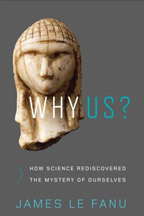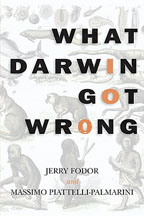| Welcome | February 22, 2010 |
||||||
Welcome to the ARN Announce email reports. These brief emails are sent out every couple of weeks to help you keep up with the top intelligent design news and resources at a glance, and provide you with quick links to more information. We also provide you with advanced notice of new products and special sales available only to our email subscribers. |
|||||||
| Product Announcements | |||||||
Two new books featured at ARN this month are not written by intelligent design proponents, but could have been. The books have nothing to say about ID, but provide powerful critiques of materialistic science and Darwinian evolution. The first book was written by a British medical doctor and the second book by a pair of secular academics. If you have been following the Darwin vs. Design debate for any length of time, these are two “must read and pass along” books.
|
|||||||
| ARN News Flash | |||||||
| |||||||
| Quotes by James Le Fanu | |||||||
Both the Human Genome Project and the Decade of the Brain have indeed transformed, beyond measure, our understanding of ourselves—but in a way quite contrary to that anticipated. Nearly ten years have elapsed since those heady days when the ‘Holy Grail’ of the scientific enterprise, the secrets of life and the human mind, seemed almost within reach. Every month the pages of the science journals are still filled with the latest discoveries generated by the techniques of the New Genetics, and yet more colorful scans of the workings of the brain—but there is no longer the expectation that the accumulation of yet more facts will ever provide an adequate scientific explanation of the human experience. (page 14) What then to make of Charles Darwin, who has cast so long a shadow over the past 150 years? He was, like so many of his contemporaries in that Golden Age of Natural History, a brilliant naturalist in extraordinary times. He had the audacity to seek a grand unifying explanation, in the tradition of his fellow countryman Isaac Newton, for the processes of life and its history. But those processes, so many billion-fold times more complex than the laws of gravity, defy such simplification. His legacy then is rather different from that commonly perceived. Together with Marx and Freud, he is one of that triumvirate whose assertion of the priority of the scientific view ‘would occupy the center stage of Western thought for so long.’….Darwin’s contributing ‘plank’ to that ‘platform of materialist science’ alone endures—but for how much longer? It certainly seems surprising in retrospect that Marx’s and Freud’s self-evidently erroneous theories should have proved so persuasive to so many and for so long. Now it is the turn of Darwin, whose reputation can scarcely survive the devastating verdict of the finding of the recent past. Before long he must fill that vacant chair in heaven alongside Marx and Freud, at which point the triumvirate will be complete. (page 261) |
|||||||
ARN Announce is produced and distributed by Access Research Network. ARN Announce describes many of the upcoming events and new articles,
books, videos and other resources on Intelligent Design. Please forward
this message to several of your friends and colleagues to let them know
about the resources available at Access Research Network (www.arn.org).
Back issues of ARN-Announce can be found at www.arn.org/announce.htm. Access Research Network is a non-profit organization dedicated to providing
accessible information on science, technology and society issues from
an Intelligent Design perspective.
TO SUBSCRIBE: Send an email to "ARN-Announce-request@arn.org". The body of the message should consist of the word "SUBSCRIBE" and nothing else. Or visit the web page at http://arn.org/mailman/listinfo/arn-announce_arn.org and select Subscribe and enter your email address. You will receive a confirmation email indicating your name has been submitted to the list. Follow the directions and reply to the email and your email address will be added to the ARN-ANNOUNCE list. TO UNSUBSCRIBE: Send an email to "ARN-Announce-request@arn.org". The body of the message should consist of the word "UNSUBSCRIBE" and nothing else. Or visit the web page at http://arn.org/mailman/listinfo/arn-announce_arn.org and select Unsubscribe and enter your email address. Your email address will be automatically removed from this list. TO CHANGE YOUR EMAIL ADDRESS: To change your email address, retrieve your password, or change other subscription options, please visit the web page at http://arn.org/mailman/listinfo/arn-announce_arn.org and select the "edit options" button at the bottom of the page. |


